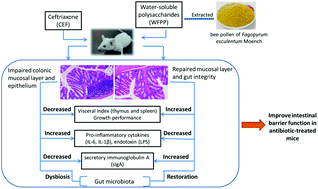A polysaccharide from Fagopyrum esculentum Moench bee pollen alleviates microbiota dysbiosis to improve intestinal barrier function in antibiotic-treated mice†
Abstract
Antibiotics are the most commonly used clinical drugs for anti-infection, but they can also destroy normal microorganisms and cause intestinal barrier dysfunction. To elucidate the effects and mechanism of a water-soluble polysaccharide from Fagopyrum esculentum Moench bee pollen (WFPP) on intestinal barrier integrity in antibiotic-treated mice, BALB/c mice were exposed to a broad-spectrum antibiotic (ceftriaxone) or not (control), and were administered low-, medium- and high-dose WFFP (100 mg kg−1, 200 mg kg−1 and 400 mg kg−1, respectively) daily by oral gavage for 3 weeks. Mice treated with ceftriaxone displayed symptoms of growth retardation, atrophy of immune organs including thymus and spleen, increased gut permeability, and intestinal barrier damage, which were restored after intervention with WFFP at different doses. Moreover, the beneficial effects of WFFP were closely associated with enhanced intestinal sIgA secretion and reduced inflammatory response. Furthermore 16S rDNA gene sequencing revealed that WFPP elevated microbial diversity and richness and changed the community structure, therefore, alleviating microbiota dysbiosis caused by ceftriaxone. Interestingly, WFPP could modulate the abundance of sIgA secretion-related bacteria (e.g. Proteobacteria) and inflammation-related bacteria (e.g. Enterococcus). Therefore, WFPP can relieve antibiotic-induced microbiota dysbiosis to improve intestinal barrier integrity by increasing intestinal sIgA secretion and inhibiting inflammation.



 Please wait while we load your content...
Please wait while we load your content...